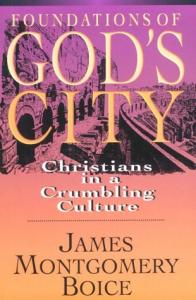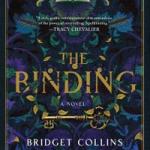Whether thinking about how to win culture wars or just how to survive in an increasing hostile world, Christians in the United States have spent a good deal of time and energy trying to articulate the best way to philosophically and practically live in this world. The famous former pastor of Philadelphia’s Tenth Presbyterian Church James Montgomery Boice was no exception, except for the fact that his book Foundations of God’s City: Christians in a Crumbling Culture is excellent, where many such books are (at best) mediocre.

That said, I think there’s an important disclaimer that has to be offered: Boice claims to be updating Augustine’s City of God for the modern world. While I think his book is solid and worthwhile, I don’t think it’s going to replace the greatest Christian work of political theology any time soon. (I suspect Boice would agree with me.)
That disclaimer offered, Foundations of God’s City really is worthwhile. Boice breaks his book into four parts: first, a short introduction warning about the rise of the new barbarians:
“A barbarian is a person who lives by power and for pleasure rather than by and for principle.” (29)
Second, he outlines the Biblical foundations for the two cities (the city of man and the City of God). The citizen body of each city is formed by two different humanities–those descended from Cain and those descended from the child of promise. The former make up those bound for hell, the latter those bound through the blood of Christ by faith for heaven.
Third, Boice articulates what he sees as the situation of the two cities today. And finally, in the fourth part he outlines what he believes the obligations of the church to be today.
Again, overall this book is excellent. Boice offers a much-needed corrective for both Christian withdrawal and Christian triumphialism. He reminds us that Christians are to live in the world (and hence not withdraw into isolation), but not be defined by the world (and hence not adopt the world’s beliefs or practices), while remembering that for now, our citizenship is in heaven and we live as pilgrims in a hostile nation (and so not assume that we will/should win control of the politics of a nation). More Christians should read this book.
One minor quibble: I’m not completely sold on his definition of ‘barbarian’ (quoted above). Or at least, I would argue that the fact that such people are coming is not really sufficient motivation for us to engage in the way Boice wants us to. What I mean by that, is that Christianity is something which everyone needs, whether they are civilized or savage. Don’t get me wrong, I’m as deeply concerned about the collapse of civilization as the next (political) conservative. But as a Christian, I realize those barbarian/civilized concerns take a back seat to the Christian/non-Christian distinction. That a person is in rebellion against God and needs to hear the Gospel of Jesus Christ is a more important difference than whether one meets whatever definition of barbarian we care to give. The Gospel is for everyone, without regard to how “civilized” they are. The Goths and Vandals who battered down the gates of Rome were just as lost as the Roman citizens cowering within the walls. The same is true in our own time.
If you want more on this topic, you can listen to the following episode of the City of Man podcast:
Dr. Coyle Neal is co-host of the City of Man Podcast and an Associate Professor of Political Science at Southwest Baptist University in Bolivar, MO













